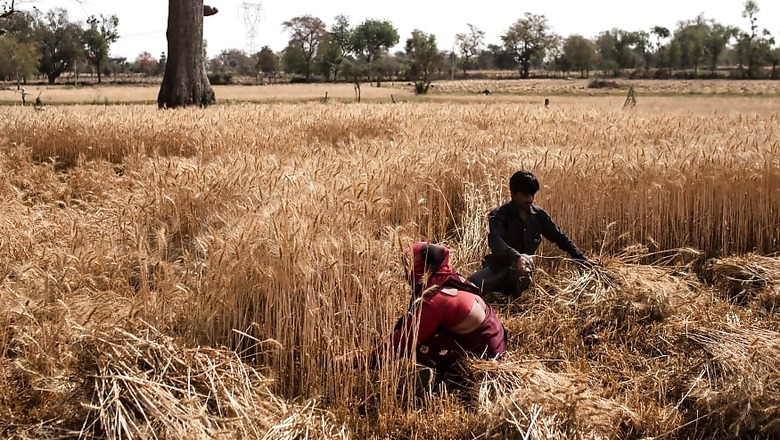
views
Jaipur: The absence of financial support from her husband who was stranded in Maharashtra, where he was working as a labourer, compelled 41-year-old Sharda Devi from Rajasthan to get enrolled for minimum wages under the Mahatama Gandhi National Rural Employment Guarantee Act (MGNREGA) on April 23.
"It became difficult to support my family of eight members due to lack of finances. Earlier, my husband, who works as a daily wage labourer at a construction site in Nagpur, used to send money every fortnight. But ever since the lockdown was imposed, he is unable to send us money because he is yet to receive his previous payment from his employer and is running short of cash," the resident of Daulatgarh village in Asind Tehsil of Rajasttabhan's Bhilwara district shared.
Sharda, a mother to four children, has now joined the bandwagon of MGNREGA workers. "People in my village suggested that I should apply for a job card and request for work. In a week's time I was allotted the card as well as the work," she said. "My elder son wanted to work, but I wanted my children to study and my elderly in-laws to rest. So I took up a job of sweeping the roads and cleaning of a local water body." She leaves home every day at 9 am and returns at 1 pm.
Like Sharda, more than one lakh new job card holders across Rajasthan have started taking up works under MGNREGA to support their families. They are mostly those who have lost their livelihood owing to the lockdown imposed due to the Covid-19 pandemic since March 24. The numbers are expected to rise as lakhs of migrants are still returning home after losing their jobs in other states.
Wages and working hours under the government flagship scheme have been revised. In Rajasthan, unskilled workers are paid Rs 220 per day against the earlier Rs 199 per day. The wages for skilled and semi-skilled workers have been increased from Rs 213 to Rs 235 per day. As per the revised structure, Sharda will get remuneration of RS 220 per day, which is exactly half of what her husband used to earn before the lockdown.
Stressing that people in rural areas will get financial support with the hike amid the novel coronavirus outbreak, panchayati raj and rural development minister of Rajasthan Sachin Pilot on April 22 said priority will be given to welfare works under MGNREGA in the state. As per the data mentioned on the website, number of workers employed under the scheme rose from 62,000 to 10 lakhs by the end of the month, and eventually on May 3, 2020, the total figure became 15. 8 lakh. Of these, one lakh are first-time job card holders.
A sizeable number of the fresh job card holders are migrant labourers who returned to their home state Rajasthan during the lockdown. Yusuf Mohammad, a 45-year-old resident of Gangapur village in Sahada Tehsil of Bhilwara district, became a first-time job card holder in April 2020 after his original work of a truck driver came to a standstill. "I returned to my village on March 25 and since then I had no work to do. All I could think of was to get enrolled under MGNREGA and look for a job in my village. For the first fifteen days I was asked to stay in home quarantine and from April 15 onwards I was allotted repair work at a nearby cattle shed. With no job avenues around, I preferred minimum wages to take care of my family of 12 members," Yusuf, the only breadwinner of his family, said. "From driving interstate, I would easily make Rs 12,000-15,000 per month. The wages I am drawing presently are too less. But it's the only avenue which is running in the lockdown and I don't see myself doing my previous job very soon. I start my work at 9 am and return home by 1.30 pm. We have been advised to wear masks, wash hands with soap four times a day and ensure social distancing," Yusuf added.
Social distancing norms
State MGNREGA commissioner PC Kishan instructed chief executive officers at the zila parishads to ensure that the migrant labourers who belong to Rajasthan and return in the lockdown are allotted work and facilitated with fresh job cards on demand. "The state's performance under MGNREGA in 2019-20 was spectacular, though progress in the second fortnight of March got affected adversely because of the coronavirus. With no clear directions by the union government on whether states are allowed to carry out works under MGNREGA or not we had to close most of the ongoing activities. Even people were scared to come out. However, after the second fortnight of April, work started to kick off. And we saw a huge number of migrant labourers and rural people enrolling and asking for work. There are advance applications for May and June," Kishan said.
Explaining the challenges faced by the department, Kishan said there are two key ones. "First is to keep a balance between supply and demand especially after March 15 onwards when lockdown and pandemic scare has doubled the distress. So we are trying to encourage the workers to work at the sites which are vast and distance could be maintained, such as construction of their own houses under the Pradhan Mantri Awas Yojana, Apna Khet Apna Kaam (where job holders are asked to work in their own fields), construction of cattle sheds, levelling of fields and works related to water harvesting, repair of playgrounds, cemeteries, etc. In 2018-19, there was a strike all over Rajasthan by MGNREGA employees, such as block development officers (BDOs), junior technical assistants (JTAs) and gram sevaks. Still we could generate 29.42 crore person days, which was the second highest in the country. So I am confident that we will do well this year too despite the coronavirus outbreak," he said.
As per Kishan, the second challenge is to maintain social distancing at the work sites. "We are strictly asking them to maintain a distance of 1-1.5 metres. Group task system has been given up. Task is being allotted to individuals and task for whole 15 days are given to an individual at a place. Moreover they have been expressly asked to wash hands four times a day, wear a mask and not spit," he added. On block level, each worker has been given a MGNREGA Covid-19 kit that includes a bar of soap and a mask. Out of 11,000 panchayats of Rajasthan, work has started in 8,500.
Those who lost livelihoods getting enrolled
Other than the migrant labourers, the new entrants also include those who have lost their livelihoods due to the lockdown. Ratan Shamu, a shoe repairer by profession, used to sit inside the bus stand of Bhilwara with his wooden tool box. But since the lockdown was announced, he is at home, like every other shopkeeper or vendor of that bus stand. However, he has also became a beneficiary of MGNREGA . "With no work around, getting enrolled under the scheme was the only option. I got a job card made and now my wife goes every day to work and I handle home chores in her absence. I used to make 200-250 rupees daily, but under this scheme she will be paid 220 per day. My worry is that after 100 days will get over, how will we survive? Because I don't see myself resuming the shoe repair work anytime soon," said the resident of Chota Tithiya village.
'Should be an opportunity, not a challenge'
MGNREGA has been a breather for lakhs of people in India whose livelihoods got affected by the lockdown. However, with an increase in the number of first-time workers, experts have urged for relaxations in the number of days as well as the types of works included under the scheme. We spoke to social activist Nikhil Dey of Mazdoor Kisan Shakti Sangathan (MKSS) on how this scheme could help reduce distress on a mass level in these dire times. "In our country people are facing hunger, starvation, migration and lack of livelihoods. No one even knows that those who became unemployed, will get their new jobs or not," he said. "The demand for work is more than the capacity. So when we see more number of people enrolling under MGNREGA, all that is needed is the flexibility with the days like never before. During the drought in past years, the Centre had increased number of guaranteed days by 50 in Karnataka, Rajasthan, Uttarakhand, etc. This time too the number of days should be doubled across all states. Also, in these testing times the beneficiaries of this scheme could span urban areas also." According to Dey, the months of April, May and June witness the maximum number of people at work under this scheme. In 2019, around 30 lakh people were working across the state. But this year the numbers could spike.
Explaining how MGNREGA should be made an opportunity instead of a challenge, Dey suggested, "During Covid-19, the concept of door-to-door services are becoming popular. So, it could be listed under MGNREGA where workers can make home deliveries. Another job opportunity could be of a caregiver. The elderly people who cannot go out and do things on their own require the support of a caregiver. Moreover, production of masks and sanitisers could be included in the list of the works."
'MGNREGA will increase purchasing power'
Rajasthan's deputy chief minister Sachin Pilot who is monitoring this scheme said, "Rajasthan government has initiated steps to generate labour-intensive opportunities in order to give regular wages to the poor villagers, the most vulnerable people. The MGNREGA will give a big boost to the rural economy, as wages received under the scheme will increase the purchasing power of the people in rural areas, which in turn will support the rural economy. I have personally requested the central government to increase the days from 100 to 150 in these tough times."
According to Jaipal, a migrant rights activist at Apna Sewa Kendra, every year around 30-40 lakh labourers from Rajasthan move to Maharashtra, Uttar Pradesh, Gujarat and Madhya Pradesh. "From southern Rajasthan, thousands of labourers used to work in various parts of Gujarat as ice cream vendors, workers in cotton fields and in the textile industry. Some of them had returned already around Holi while others are coming back or are stuck there. So the demand of jobs will certainly increase."
'India's economy is in distress'
According to experts, the spike in the number of first-time job card holders is an indicator that India's economy is in distress. Noted economist and former union finance secretary Arvind Mayaram considers the lockdown a major financial disaster after demonetisation which will have its impact for another 2-3 years. "After a massive slump in jobs at rural and urban sites, this country needed an employment guarantee scheme. MGNREGA has once again come up as a powerful tool to enhance livelihood security. The law was enacted in 2005 but it was much ahead of its time. It won't only give jobs to people but will also empower them to buy essential items which will in return restart production." Mayaram believes that the Covid-19 outbreak has led to a large-scale destruction of white-collar jobs in urban areas. "They (the workers) may hail from rural India but they had found jobs in malls, MSMEs after learning some basic skills. They were making Rs 12,000-15,000 per month, but now even if they go back to their homes they will find it difficult to survive," he added.
Throwing light on how this scheme braved politics and yet again emerged as a lifeline in rural India, Mayaram, who also holds the post of economic adviser to Rajasthan chief minister Ashok Gehlot, added, "In 2014, when the NDA came to power, they were against the scheme and called it counterproductive, because they thought it would make people lazy. But in reality, MGNREGA empowered the labourer and gave him bargaining power. Labourers started getting a good deal outside MGNREGA, which in return elevated their lifestyle, purchasing power and education. In 2005, when it promised a guarantee of 100 rupees per day, at that time average rural wages were around 35 rupees. This not only brought financial security to them but also boosted their confidence. According to the World Bank, since 2005, close to 150 million people came out of poverty with the help of this scheme, which is the fastest compression of poverty in the world."
How the numbers stack up
Rajasthan had generated 32.89 crore person days in 2019-20, which is the highest ever person days generation in the last 10 years. Also, a mammoth 8.48 lakh households completed 100 days in 2019-20, the highest in last 10 years, and Rajasthan stood first on this parameter nationally. Around 3.36 lakh works could be completed. Another 1.5 lakh works were physically completed. That makes the total figure between 4.5 lakh and 5 lakh. A total of Rs 6703 crore was spent on MGNREGA in 2019-20. The total number of households that worked in 2019-20 was 55.78 lakh and the total number of individuals who worked was 80.58 lakh. The percentage expenditure in agriculture and allied activities is 66.31% against a desirable 60%. The percentage of women person days out of total person days is 67.32%.














Comments
0 comment